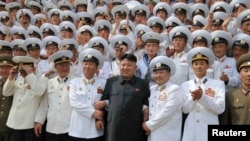GENEVA —
The U.N. special investigator on the human rights situation in North Korea says imaginative new approaches are needed to turn around the country's appalling record of violations against its people.
In a new report, Marzuki Darusman says it is time to move away from the old method of submitting reports and passing resolutions of condemnation against North Korea at the U.N. Human Rights Council. He says it is time for the international community to reconsider its exclusive focus on the tragedy and heinous violations taking place in that country.
“You can go down the list - prison camps, death squads, and the whole range of violations," he said. "But it has been proven that a continuing battering on the basis of findings and of updated information gets us nowhere closer to a resolution of this matter-in terms of accountability, but also in terms of engagement of the country.”
Darusman says North Korea must be made accountable for its crimes. He says the Security Council is the only body that can refer perpetrators to the International Criminal Court.
He says countries that have influence on North Korea, such as China, should be persuaded to put greater pressure on the government to end its violations. But the U.N. investigator is mainly pinning his hopes on the establishment of a field office in South Korea.
The field office, which is likely to open in the next couple of months, will act as a permanent watchdog of developments in North Korea. The office staff would interview high-level escapees, look into the structures of the country, carry out investigations, and monitor and document evidence of abuse.
“It would also be involved in outreach to the international community, to continue to keep the international community aware of this situation in the North and not reduce this issue to a half hour or an hour debate every March on a resolution,” he said.
The field office is expected to work closely with a so-called Contact Group, composed of representatives of 10 countries. Darusman says the group will be a bridge between the Council’s two-yearly sessions to keep North Korea’s atrocious human rights record on the international front burner, with the aim of making the government accountable for its actions.
In a new report, Marzuki Darusman says it is time to move away from the old method of submitting reports and passing resolutions of condemnation against North Korea at the U.N. Human Rights Council. He says it is time for the international community to reconsider its exclusive focus on the tragedy and heinous violations taking place in that country.
“You can go down the list - prison camps, death squads, and the whole range of violations," he said. "But it has been proven that a continuing battering on the basis of findings and of updated information gets us nowhere closer to a resolution of this matter-in terms of accountability, but also in terms of engagement of the country.”
Darusman says North Korea must be made accountable for its crimes. He says the Security Council is the only body that can refer perpetrators to the International Criminal Court.
He says countries that have influence on North Korea, such as China, should be persuaded to put greater pressure on the government to end its violations. But the U.N. investigator is mainly pinning his hopes on the establishment of a field office in South Korea.
The field office, which is likely to open in the next couple of months, will act as a permanent watchdog of developments in North Korea. The office staff would interview high-level escapees, look into the structures of the country, carry out investigations, and monitor and document evidence of abuse.
“It would also be involved in outreach to the international community, to continue to keep the international community aware of this situation in the North and not reduce this issue to a half hour or an hour debate every March on a resolution,” he said.
The field office is expected to work closely with a so-called Contact Group, composed of representatives of 10 countries. Darusman says the group will be a bridge between the Council’s two-yearly sessions to keep North Korea’s atrocious human rights record on the international front burner, with the aim of making the government accountable for its actions.




